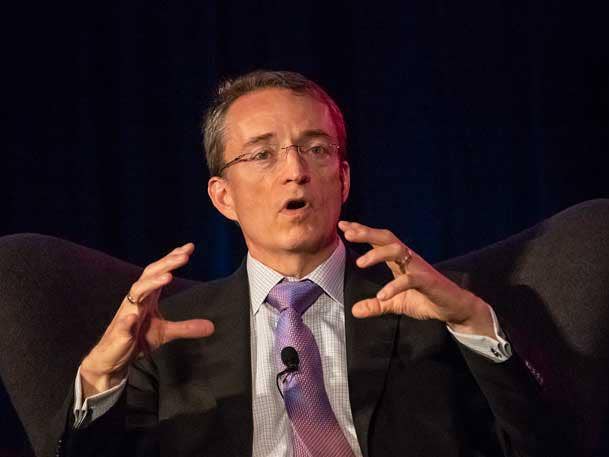Gelsinger: Intel Will Expand Manufacturing, Make Chips For Others
While Intel is significantly expanding its manufacturing capacity, Intel CEO Pat Gelsinger says the company will increase its use of external foundries for a range of Intel products. The company is also launching a new business to help other companies manufacture chips in the U.S. and Europe.

Intel CEO Pat Gelsinger said the company will significantly expand its manufacturing operations and create chips for other companies while also increasing its use of external foundries as part of an “IDM 2.0” strategy that will create a “new era of innovation and product leadership” at Intel.
[Related: Partners: AMD EPYC Milan Widens Gap Over Intel, Builds Trust]
Gelsinger’s IDM 2.0 strategy was detailed Tuesday in a webcast and press release on the chipmaker’s website, which said the manufacturing expansion plans will begin with a roughly $20 billion investment for two new fabs in Arizona. The Santa Clara, Calif.-based company called Gelsinger’s strategy a “major evolution” of its integrated device manufacturing model.
“We are the only company with the depth and breadth of software, silicon, platforms, packaging and process with at-scale manufacturing our customers depend on for their next-generation innovations to meet this moment and position our company for the future,” he said in the webcast.
Intel’s stock price was up more than 4 percent in after-hours trading.
These two new fabs in Arizona will support Intel’s products but also a new standalone business for the company, Intel Foundry Services, which will “become a major provider” of chip manufacturing capabilities for companies in the United States and Europe, according to Gelsinger, who said the business will be led by Randhir Thakur.
Intel is working with the state of Arizona and President Joe Biden’s administration on incentives to support the new factories, Gelsinger said. He added that the company is also competing for a contract with the U.S. Department of Defense to build a “domestic, commercial foundry that will also meet the security needs of the U.S. government.”
Gelsinger promised that Intel plans to invest more capital into new fabs across the world. He said he expects the company to announce further expansion plans in the U.S., Europe and other global locations “within the year.”
Gelsinger said Intel believes the total addressable market for foundry services will be $100 billion by 2025, “with most of the growth coming from leading-edge computing, which is our expertise.” The establishment of more foundry capacity in the U.S. will help balance out the heavy concentration of foundries in Asia, he added.
“We are committed to ensuring this capacity will support commercial customers as well as address unique government and security requirements in the U.S. and [Europe],” he said.
Gelsinger said the new Intel Foundry Services, which represents an expansion of Intel’s current foundry offerings, has already received the support from Amazon, Cisco, Ericsson, Google, IBM, Microsoft and Qualcomm.
Intel Foundry Services will differentiate itself from other chip foundries like TSMC and Samsung with “a combination of leading-edge packaging and process technology, committed capacity in the U.S. and Europe available for customers globally and a world-class IP portfolio,” according to Gelsinger.
Gelsinger said that means Intel will offer foundry customers its IP for x86 processor cores, graphics, AI and interconnect, but the business will also support customers who have designs based on Arm and RISC-V architectures.
While Intel is significantly expanding its manufacturing capacity, Gelsinger said the company will increase its use of external foundries TSMC, Samsung, GlobalFoundries and UMC for a range of Intel products, including those in the PC and data center markets starting in 2023.
“We will expand our use of third-party foundry capacity across our portfolio to deliver the best products in every category that we participate in,” he said. “This will provide us with increased flexibility and scale we need to optimize our roadmaps for cost, performance, schedule and supply, giving us a unique competitive advantage,” he added.
Gelsinger, who became CEO of the company last month, revealed his plans Tuesday after promising in January that he would overcome the company’s manufacturing problems and return the chipmaker to its “position of the unquestioned leader in process technology.”
Intel has suffered from manufacturing issues in the last few years that have resulted in delays for both 10-nanometer and 7nm products, which has allowed manufacturing rivals TSMC and Samsung to arm fabless chipmakers like AMD and Nvidia with next-generation processes sooner.
In his webcast Tuesday, Gelsinger said the company has made good progress on its 7nm process and that Intel expects to “tape in” the compute tile of its first 7nm client CPU title, code-named Meteor Lake, in the second quarter of this year.
Gelsinger said Meteor Lake will feature a “breakthrough new x86 architecture and modular design” that will involve using multiple manufacturing processes across its silicon technology stack as well as Intel’s Foveros 3D packaging technology.